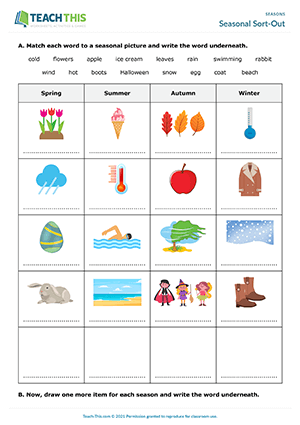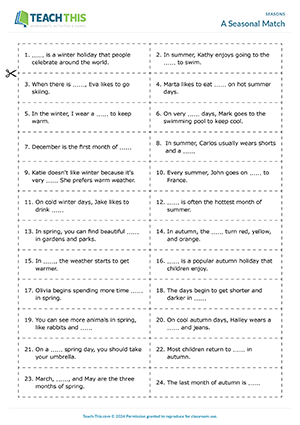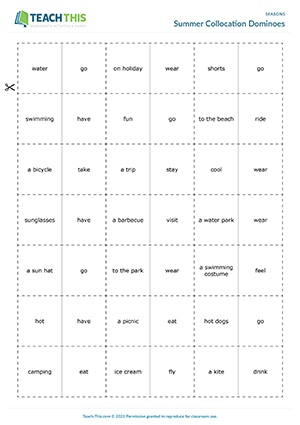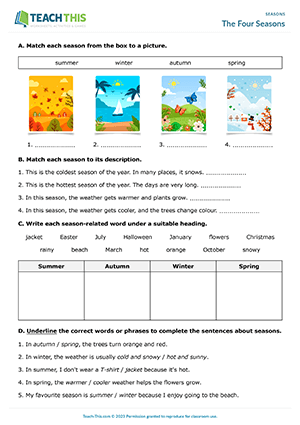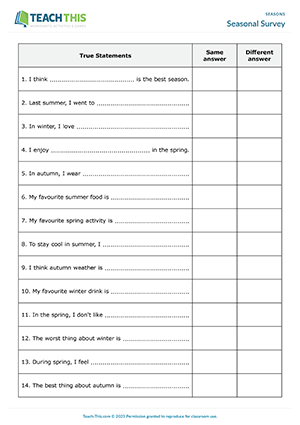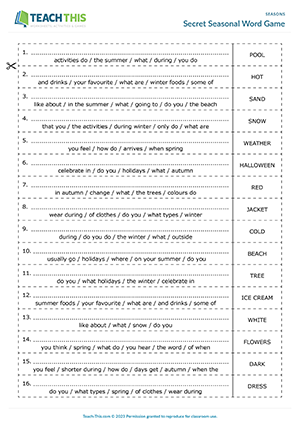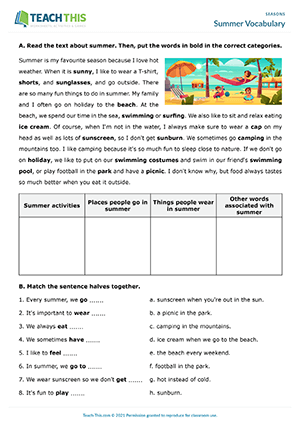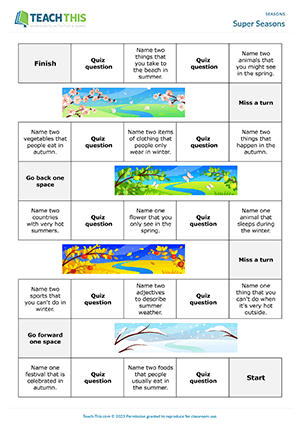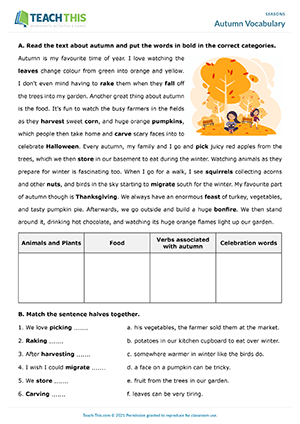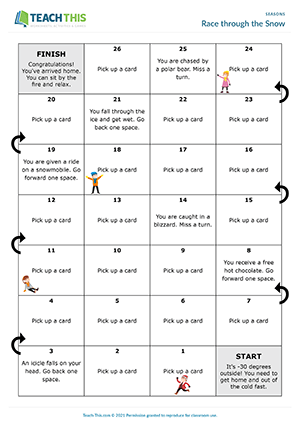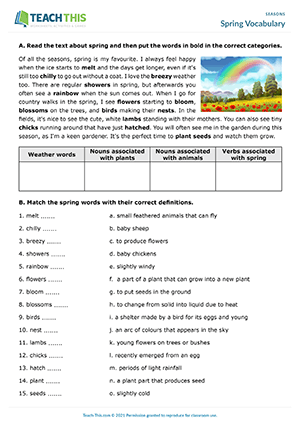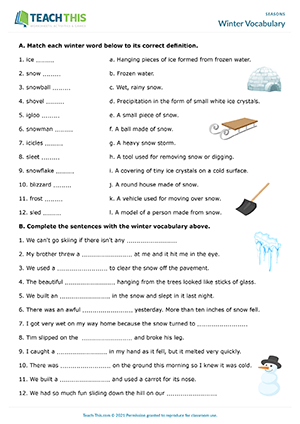In these free four seasons games, students match vocabulary with pictures related to the four seasons and play a memory game and guessing game using the seasonal vocabulary. First, students match each word to a seasonal picture and write the word underneath. Students then draw one more item for each season and write the word underneath. Next, in pairs, one student puts their worksheet face down and tries to remember all the vocabulary from one season, e.g. 'The spring words are..." For each correct answer, the student scores a point. Then, their partner does the same for another season. This continues until all four seasons have been covered. Next, students take it in turns to guess their partner's pictures using similar language. Students get two guesses for each picture. If they guess the item correctly the first time, they score two points. If they guess right the second time, they get one point. The student with the most points at the end of the game wins.
Here are two enjoyable seasons vocabulary games to help students practice words related to spring, summer, autumn and winter. First, students play a pelmanism game to practice the season-related vocabulary. In pairs, students take turns turning over one gap-fill sentence card and one season word card. If the season word completes the sentence, the student reads the sentence aloud, keeps the two cards, and plays again. If not, the student turns the two cards back over. The student with the most cards at the end of the game wins. After that, students play a game in which they make sentences using the season-related vocabulary. With a new partner, students take turns picking up a card and reading the season word to their partner, who has 20 seconds to make a meaningful sentence with the word, without repeating sentences from the previous game. If the student is able to make a sentence, they win and keep the card. The student with the most cards at the end of the game wins.
In this engaging summer collocations game, students play dominoes by making sentences with collocations related to summer. The first player places one of their dominoes at one end of the domino on the table, pairing a verb with a summer word or vice versa to make a collocation. The player then makes a sentence using the summer collocation and says it to the other group members, e.g. 'Let's go camping this summer'. If the sentence is grammatically correct and makes sense, the domino remains in place. If not, the player must take back the domino. Play then passes to the next student and so on. The first player to get rid of all their dominoes wins the game.
This detailed four seasons worksheet helps students learn and practice vocabulary related to spring, summer, autumn and winter. First, students match each season to a picture. Students then match each season to its description. Next, students write each season-related word under a suitable heading. After that, students underline the correct words or phrases to complete sentences about seasons. Following that, students match sentence halves and complete each sentence with a season. Next, students think of and write down two examples for each season-related item and then compare their answers with a partner. Lastly, students ask and answer seasonal conversation questions with their partner.
In this insightful seasonal habits speaking activity, students conduct a survey about seasonal habits and preferences. First, students complete statements related to seasonal habits and preferences on the worksheet with true information. Next, students go around the class, asking and answering the questions to try to find someone with the same answer and someone with a different answer. When a classmate replies with the same answer, the student writes the person's name in the 'Same answer' column. If not, the student writes the classmate's name and response in the 'Different answer' column. The first student to complete both columns with names is the winner. Lastly, students report back to the class on what they found out about their classmates' seasonal habits and preferences.
In this productive seasons vocabulary game, students ask and answer season-related questions to try to elicit words related to seasons. In two groups, students put words on question cards in the correct order to make season-related questions. Next, students pair up with someone from the other group. Pairs then play a game where they take turns asking questions to try to get their partner to say a secret seasonal word that is shown on the question card. One student chooses one of their cards and asks the question to their partner, who answers, giving as much detail as possible. If the student hears the secret word in their partner's answer, they say 'Stop' and the card is set aside. It is then the other student's turn. If the secret word isn't said, the student asks follow-up questions until their partner says the secret word. The first pair to say all the secret seasonal words wins the game.
In this comprehensive summer vocabulary worksheet, students learn and practice common words associated with summer. To begin, students read a short text about summer and categorize summer vocabulary from the text. Next, students match sentence halves together that use collocations associated with summer. After that, students match summer words with their correct definitions. Students then go on to write two answers for each item shown, e.g. 'Write down two things you take with you to the beach'. Finally, students work with a partner and take it in turns to guess the two answers their partner wrote for each item.
Here is a fun seasons board game to help students practice or review vocabulary related to the four seasons. In groups, players take turns rolling the dice and moving their counter along the board. When a player lands on a 'Name...' square, they have 15 seconds to name the item or items on the square. If they fail to do this, they move their counter back two squares. When a player lands on a 'Quiz question' square, another student picks up a quiz question card and reads out the multiple-choice question and possible answers to the player. If the player guesses the correct answer, they roll the dice and move forward the number of squares displayed on the dice. If not, they roll the dice and move back the number of squares shown on the dice. The first player to reach the finish wins the game.
Here is a free autumn vocabulary worksheet to help teach students words related to the autumn season. First, students read a text about autumn and categorize autumn vocabulary from the text. Next, students match sentence halves together that use verbs associated with autumn. After that, students match each autumn word with its correct definition. Students then move on to think of and write two answers for each of the items shown, e.g. 'Write down two vegetables that are harvested in autumn'. In pairs, students then take it in turns to guess the two answers their partner wrote for each item. Students are allowed two guesses each time and score one point for each correct answer. The student with the most points wins.
In this entertaining winter board game, students perform winter-related mimes for a teammate to guess. In competing teams of two, students take it in turns to pick up a card and mime the winter activity on the card to their teammate. Their teammate has one minute to guess what winter activity their partner is doing by making an appropriate present continuous sentence, e.g. 'You are riding on a sled'. If the student is able to guess the winter activity and make the correct sentence, the team rolls the dice and moves their counter along the board. If not, they stay on the same square and don't roll the dice. The first team to reach the finish is the winner.
This useful spring vocabulary worksheet helps to teach students common words related to the spring season. To start, students read a short text about spring and categorize spring-related vocabulary from the text. Students then match each spring word to its correct definition. Next, students complete sentences with the spring vocabulary from the previous exercises. After that, students read and discuss statements about spring with a partner and guess if they are true or false. In the last exercise, pairs talk about things they like and don't like about spring and compare their ideas.
This handy winter vocabulary worksheet helps to teach students common words related to the winter season. Students start by matching each winter word to its correct definition and completing gap-fill sentences with the winter vocabulary. After that, students match sentence parts together to practice other words related to winter. Students then move on to complete sentences with their own ideas using the vocabulary. In the last exercise, students draw a winter scene using as many winter words from the worksheet as they can. In pairs, students then describe their picture to their partner for them to draw. Afterwards, students compare their pictures to spot the similarities and differences.
Latest Free
Resources
- Jigsaw Reading
Reading Exam Preparation (B1)
Date Added: 7th of March
- Writing Jeopardy
Writing Exam Preparation (B1)
Date Added: 6th of March
- Present Perfect Bingo
Present Perfect Yes No Questions (A2)
Date Added: 4th of March
- Count on Me!
Making Offers and Promises (A2)
Date Added: 11th of February
- It’s Carnival Time!
Cultural Celebrations (B1)
Date Added: 29th of January
Latest Member
Resources
- Shops and What They Sell
Shopping (B1)
Date Added: 12th of March
- Who has written this?
Present Perfect Yes No Questions (A2)
Date Added: 11th of March
- Business Greetings and Introductions
Networking (B2)
Date Added: 11th of March
- Have you done this?
Present Perfect Yes No Questions (A2)
Date Added: 7th of March
- True, False or Not Given
Reading Exam Preparation (B2)
Date Added: 7th of March



